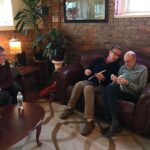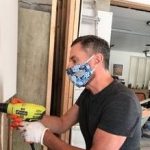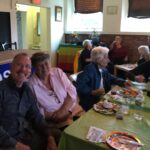More details about John Mikytuck, Executive Director
After graduating from Cornell University’s Hotel School, Mikytuck moved to New York City to begin working at the Waldorf Astoria. At the time, HIV/AIDS had no treatment and 100s of thousands of gay men had already died. Seeing this for the first time, Mikytuck began volunteering at the American Foundation for AIDS Research (AMFAR). Within a year, Mikytuck quit the Waldorf and began working on HIV/AIDS prevention projects with leading HIV/AIDS organization.
Over the next several years, Mikytuck worked with the New York Gay Men’s Health Crisis (GMHC), New York City Gay & Lesbian Community Center (GLCC) and the Long Island Association for AIDS Care (LIAAC) to create public health campaigns to fight spread of HIV/AIDS. Several of his campaigns were the first of their kind, including targeted messages to African American and Latino men.
In 1996, when miraculous treatments for HIV/AIDS became available, Mikytuck left AIDS advocacy and started working for corporate America at a temp agency in New York City. On one of Mikytuck’s first assignments he was sent to A&E Television Networks (owners of History Channel, A&E, and Biography Channels) to work in their newly created “New Media” Department. At the time, AOL was the leading internet provider and 56k dial-up modems were the dominent means for people to browse the newly emerging world wide web.
Mikytuck stayed at A&E for the next 4 years, developing as an online producer, writer and director, at the same pace as the web was gaining moment as a new technology and means of communication. During Mikytuck’s time at the cable company, he produced some of the A&E and the History Channel’s first online digital media projects, including their first streaming web video series BioBytes, their first online web store, and their first national TV ad campaign for Historychannel.com, AandE.com, and Biography.com.
Just before the dot com bubble burst, Mikytuck left A&E to temporarily move to Key West, FL. Mikytuck fell in love with the amazing island community and stayed for the next 6 years. Unknown by many, Key West’s gay population had been devastated by HIV/AIDS. Still today, Key West continues to fight the disease. While in Key West, Mikytuck returned to HIV/AIDS work beoming Director of Education and Prevention at AIDS Help, Key West’s only AIDS service organization. Mikytuck’s responsibilities included overseeing HIV/AIDS public health campaigns throughout the Florida Keys and Key West (one of America’s most popular tourist destinations).
During this period, Mikytuck began researching the HIV risk behaviors of gay tourists on vacation, an area of public health that had not previously been studied. Mikytuck’s research, conducted with support from the Medical College of Wisconsin’s Center for AIDS Intervention Research, met with considerable resistance from Florida’s tourism industry, but proved eye-opening. Mikytuck’s findings were presented at the 2004 International AIDS Conference in Bangkok, Thailand and later published in national peer reviewed journals. Mikytuck’s research continues to be utilized by behavioral scientists working in HIV/AIDS prevention around the world today.
While living in Key West, Mikytuck served as a member of the Key West Citizen Newspaper’s editorial board and founded Key West’s first tenant’s association. As part of his work for Key West tenants, Mikytuck co-authored and helped pass a city resolution that created Key West’s first affordable housing task force, later serving as a member.
In 2006, after enduring a series of devastating hurricanes, and a real estate bubble that left many working Floridians scrambling for affordable housing, Mikytuck returned to New York City to attend Columbia University’s Graduate School of Journalism, a dream he’d had for many years. While in graduate school, Mikytuck returned to online media and began collaborating with classmates on a news and media website. Combining journalism with HIV/AIDS advocacy, Mikytuck created, produced and hosted Reporting AIDS, an online web video news series. During his series, Mikytuck interviewed many leading HIV/AIDS figures. In 2007, Mikytuck won an Emmy Award for one of the series episodes on ‘Youth & AIDS’, a story on abstinence-only HIV prevention programs.
After graduating from Columbia in 2009, Mikytuck produced and directed The Newcomer, a hard-hitting feature documentary about Richard Heyman (America’s first openly gay mayor). The film was screened at the Miami LGBT Film Festival and later aired on PBS.
In 2010, Mikytuck began producing for In The Life, PBS’s longest-running LGBT television series. On assignment, Mikytuck began reporting on LGBT youth homelessness, one of the most under-reported issues impacting the LGBT community. Juvenile Injustice, a 15-minute feature story aired on PBS that same year. After producing the story, Mikytuck began volunteering to raise awareness about LGBT youth homelessness. In 2011, Mikytuck moved back to his home state of New Jersey to work for NJ’s first group home for LGBT homeless youth. Over the next three years, Mikytuck became a leading voice for NJ’s LGBT youth homeless population. In 2013, he co-founded Becoming Visible, NJ’s first conference to address LGBT youth homelessness, and in 2014, he co-founded the NJ LGBTQA Youth Stakeholders Group, a coalition of over 30 NJ organizations working to address issues impacting the community.
Over his career, Mikytuck’s work has been supported by a wide range of public and private institutions including the National Institutes of Health (NIH), Health and Human Services Administration (HHS), Substance Abuse and Mental Health Services Agency (SAMHSA), New York City Community Trust, Broadway Cares Equity Fights AIDS, Cable Positive, and many other private foundations and individuals.







